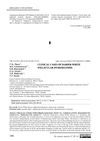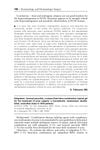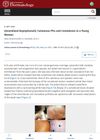 October 2022 in “Medičnì perspektivi”
October 2022 in “Medičnì perspektivi” Darier-White disease causes skin and nail issues, starts around age 20, worsens until 40-50, and has poor treatment options.
[object Object]  July 2022 in “International journal of medical science and clinical invention”
July 2022 in “International journal of medical science and clinical invention” Women with irregular periods should be checked for PCOS and treated early to prevent complications, with birth control pills helping to manage symptoms.
 July 2021 in “Journal of dermatology research and therapy”
July 2021 in “Journal of dermatology research and therapy” Using combined treatments can help manage acne by targeting the bacteria and skin changes that cause it.
 May 2021 in “Dermatopathology”
May 2021 in “Dermatopathology” The review emphasizes the need to recognize skin conditions that affect hair follicles and sweat glands to avoid misdiagnosis.
 January 2019 in “ARC journal of pharmaceutical sciences”
January 2019 in “ARC journal of pharmaceutical sciences” Acne can be managed with various treatments and requires psychological support due to its emotional impact.
 January 2018 in “Springer eBooks”
January 2018 in “Springer eBooks” Different races and genders have unique skin and hair issues, requiring specialized care and more research for effective treatment.

Tailored nonsurgical cosmetic procedures are crucial for safely treating diverse skin types, especially skin of color.
 January 2018 in “Elsevier eBooks”
January 2018 in “Elsevier eBooks” The document concludes that proper diagnosis and treatment of follicular disorders are crucial, with specific treatments for conditions like acne, drug-induced eruptions, and rosacea.
 December 2017 in “Springer eBooks”
December 2017 in “Springer eBooks” Transplant patients often get skin problems, with treatments varying by condition.
 August 2016 in “Journal of evolution of medical and dental sciences”
August 2016 in “Journal of evolution of medical and dental sciences” Most acne patients were young males with face acne, with many experiencing worsening in summer and diet-related aggravation.
 April 2016 in “Journal of The American Academy of Dermatology”
April 2016 in “Journal of The American Academy of Dermatology” The study found that severe alopecia areata affects any age, treatments often give temporary results, and some factors predict worse outcomes.
 April 2016 in “Journal of The American Academy of Dermatology”
April 2016 in “Journal of The American Academy of Dermatology” People with certain allergic conditions or higher white blood cell counts have more severe hair loss, and treating hair and nail side effects early in melanoma therapy can improve quality of life.
 April 2016 in “Journal of The American Academy of Dermatology”
April 2016 in “Journal of The American Academy of Dermatology” Both atopy and eosinophilia are linked to more severe hair loss in people with alopecia areata.
 January 2016 in “Springer eBooks”
January 2016 in “Springer eBooks” Pubertal acne is linked to hormonal changes, affects quality of life, and is treated similarly to adult acne.
January 2016 in “Dermatology Online Journal” Hormonal therapy changes skin and hair in transgender patients, who need better researched dermatologic care.
 November 2015 in “International journal of science and research”
November 2015 in “International journal of science and research” Adult acne is mostly inflammatory, affects women more, and often scars, needing good treatment to prevent damage.
 November 2014 in “John Wiley & Sons, Ltd eBooks”
November 2014 in “John Wiley & Sons, Ltd eBooks” Eating high-glycemic and dairy foods can increase hormones that may cause acne and other health issues.
[object Object]  July 2011 in “British Journal of Dermatology”
July 2011 in “British Journal of Dermatology” Dermatologists give better information on pathology forms, hypersensitivity vasculitis is a common skin issue, misdiagnoses can occur, and various skin conditions are linked to loss of elastin or genetic factors.
 January 2011 in “Yearbook of Dermatology and Dermatologic Surgery”
January 2011 in “Yearbook of Dermatology and Dermatologic Surgery” The adapalene-benzoyl peroxide gel works better and faster for acne treatment than using either ingredient alone, with manageable side effects.
 December 2008 in “The American Journal of Cosmetic Surgery”
December 2008 in “The American Journal of Cosmetic Surgery” Multi-pass laser skin treatments improved healing, reduced pain, and had no major complications.
 January 2003 in “Elsevier eBooks”
January 2003 in “Elsevier eBooks” Androgens and other hormones affect hair growth and skin conditions like acne.
 18 citations,
October 2016 in “Clinics in Dermatology”
18 citations,
October 2016 in “Clinics in Dermatology” The document talks about hard-to-treat and rare acne types, their connection with other health issues, the importance of correct diagnosis, and the challenges in managing them.
September 2021 in “CRC Press eBooks” Dissecting cellulitis of the scalp is a condition that causes inflammation and scarring on the scalp, mainly affecting African-American men, and can lead to permanent hair loss.
January 2005 in “Experimental Dermatology” Genetic factors play a major role in acne.
463 citations,
September 2004 in “Clinics in dermatology” Effective acne treatments should reduce sebum, bacteria, and inflammation, with isotretinoin being the best for severe cases.
103 citations,
September 2004 in “Clinics in dermatology” Blocked hair follicles cause acne, and studying tiny early acne spots helps understand its severity.
81 citations,
January 2000 in “American journal of clinical dermatology” Various treatments can improve post-acne scars, but results vary.
 1 citations,
December 2022 in “Archives of Dermatological Research”
1 citations,
December 2022 in “Archives of Dermatological Research” Acne treatment with isotretinoin increases the presence of p53, a protein, in skin and oil glands, which may help reduce acne severity.
 May 2024 in “Indian Journal of Dermatology”
May 2024 in “Indian Journal of Dermatology” The woman has a rare skin condition called follicular Dowling-Degos disease, which has limited treatment options.
62 citations,
July 2022 in “Science Immunology” TREM2 macrophages and unsaturated lipids contribute to acne inflammation.























